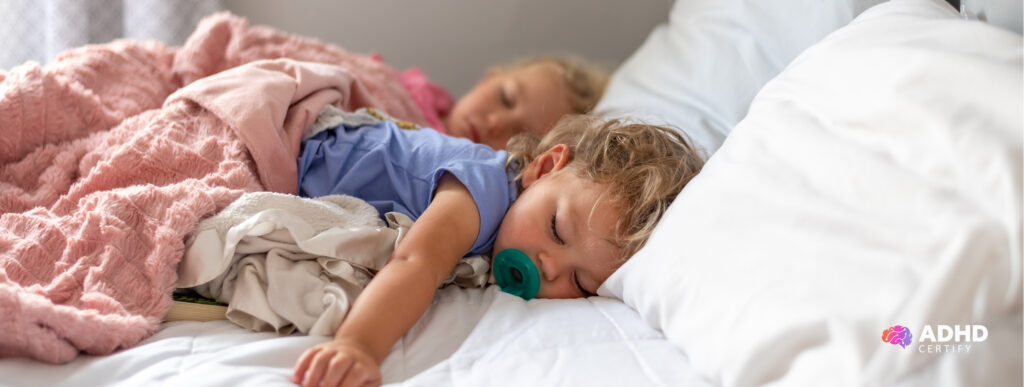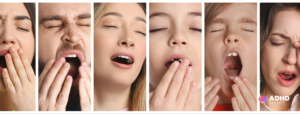Why does summer make sleep harder, especially for people with ADHD?
Because longer days, looser routines, and extra screen time throw an already-sensitive system into chaos.
Those with ADHD and sleep challenges often struggle to settle at the best of times, but in summer, the shifts in daylight and routine can push bedtime even further off track.
The result?
Exhausted mornings, frayed tempers, and a ripple effect on focus and mood.
“Almost 75 per cent of children with ADHD have sleep problems. Poor sleep can make daytime behaviour and schoolwork worse and affect the quality of life of the whole family” (Southampton researchers launch new study to help children with ADHD sleep better – uhs.nhs.uk).”
This blog offers science-informed, practical advice to help children, teens, and adults navigate summer sleep disruptions ADHD often brings, with simple tools to support more peaceful nights and steadier days.
Why Summer Disrupts Sleep for People with ADHD?
Many triggers behind summer sleep disruptions ADHD causes relate to how the ADHD brain responds to changes in light, structure, and stimulation.
Longer Days and More Daylight Exposure
Extended daylight hours delay melatonin release, making it harder to feel tired at a typical bedtime. This can be especially challenging for those with light sensitivity.
Changes in Routine and Structure
Without school or a regular daily schedule, sleep and wake times often shift. People with ADHD and sleep challenges may find it harder to maintain any kind of consistent rhythm.
Increased Screen Time and Evening Stimulation
Tablets, games, and streaming often spike during holidays. The mental stimulation and blue light can overstimulate the brain and delay sleep.
ADHD and Natural Circadian Rhythm Delays
Many people with ADHD circadian rhythm disruptions naturally feel more alert at night, and summer only widens that gap.
The Relationship Between ADHD and Sleep
Sleep and ADHD are tangled in both directions, poor sleep makes symptoms harder to manage, and ADHD itself often makes it difficult to rest.
How Sleep Deficits Affect Focus and Behaviour
When someone with ADHD is sleep-deprived, their ability to regulate attention and behaviour drops sharply. Tasks feel harder, concentration slips, and forgetfulness increases. For children, this might look like hyperactivity or emotional outbursts. For adults, it often feels like burnout before midday.
Emotional Dysregulation and Irritability from Lack of Sleep
Tiredness shrinks emotional bandwidth. Without deep, restorative sleep, the ADHD brain may struggle to process stress or shift moods. This can lead to shorter tempers, bigger reactions, or simply feeling overwhelmed by small things.
The Role of Melatonin and Sleep Architecture in ADHD
People with ADHD often produce melatonin later in the evening, delaying natural sleepiness. On top of that, their sleep stages may be lighter or more fragmented, which reduces the brain’s chance to reset. This is where the conversation around ADHD and melatonin often begins, though natural methods can help support regulation too.
ADHD-Friendly Tips for Managing Summer Bedtimes
Building an ADHD bedtime routine during summer means blending structure with sensory calm, something predictable, but flexible enough to actually work.
Keep Consistent Sleep and Wake Times
Even during school holidays, waking and sleeping around the same time each day helps regulate the internal clock. Try shifting slowly if needed, but aim for rhythm, not perfection.
Create a Visual or Written Evening Routine
A bedtime routine for ADHD child or adult might include clear, step-by-step visuals or checklists. This helps remove guesswork and gives a sense of control. For some, ticking things off or seeing a routine laid out can reduce resistance and anxiety.
Use Blackout Curtains and Minimise Light Exposure
Evening light can block melatonin. Drawing curtains early, dimming the house, or wearing sunglasses in the late afternoon (yes, really) can help send sleep cues to the brain, especially for those with delayed ADHD circadian rhythm patterns.
Reduce Evening Screen Time and Blue Light
Screens stimulate the brain and suppress melatonin. Aim to wind down devices an hour before bed. Blue light filters help, but unplugging fully makes a bigger difference.
Try Tools Like White Noise, Weighted Blankets, or Relaxation Apps
Many with ADHD are sensory-sensitive. White noise machines, sleep stories, gentle pressure from weighted blankets, or mindfulness apps can help quiet the mind and body. For parents navigating their own ADHD and sleep challenges, Supporting Mothers with ADHD: Managing Sleeplessness and Exercise offers additional strategies to build rest and movement into daily life.
Supporting Children with ADHD at Bedtime
Supporting a child with ADHD at night often means combining predictability, comfort, and calm in a way that meets their unique needs.
Offer Predictability and Autonomy
Children with ADHD often respond well to clear routines, but only if they feel involved. Letting them choose pyjamas, a bedtime story, or the order of their routine helps them feel in control while still providing needed structure.
Address Sensory Sensitivities That Disrupt Sleep
Some children are bothered by seams in pyjamas, the hum of a fan, or even the texture of sheets. Others need deep pressure or background noise to feel safe. Understanding these sensory needs, and adjusting the environment accordingly can make all the difference. If your child is also autistic or highly sensory-sensitive, “Autism Detect’s guide on Creating a Better Environment for an Autistic Child offers practical strategies for designing calming, supportive spaces.”
Encourage Calming Pre-Bedtime Activities
Activities like reading, drawing, gentle yoga, or simply cuddling can help transition from the buzz of the day to a more relaxed, sleep-ready state.
Final Thoughts
If sleep has unravelled this summer, you’re not alone. ADHD and sleep issues are common, especially when daily routines go off-course, but they’re not unfixable. With consistency, creativity, and the right support, even the most chaotic evenings can become calmer over time.
For some families, sleep difficulties might signal that it’s time to better understand how ADHD is affecting day-to-day life. If bedtime battles, emotional overload, or night-waking are part of a bigger pattern, a professional perspective can help.
We offer both ADHD assessments for adults and ADHD assessments for children to support families at every stage, from first questions to long-term strategies. With the right guidance and consistent support, nights can become more restful, and days a little easier to manage.
Frequently Asked Questions
Can ADHD medication affect summer sleep patterns?
Yes. Some stimulant medications can make it harder for children to fall asleep, especially if taken later in the day. During summer, when routines shift and bedtimes drift, this effect may become more noticeable. If sleep becomes a regular struggle, speak to your child’s prescriber, they may suggest adjusting timing or reviewing the current plan.
Should melatonin supplements be used for ADHD-related sleep problems in children?
Melatonin is sometimes recommended, but it’s not a one-size-fits-all solution. It’s best used under medical guidance, especially in children. “NHS paediatric teams may recommend melatonin in specific cases where sleep onset is significantly delayed” (“Cheshire & Merseyside NHS Formulary”).
How does physical activity during the summer impact ADHD sleep quality?
Daily movement helps regulate energy and sleep. Outdoor play, swimming, or even evening walks can help the body wind down more naturally at bedtime.
Are there specific foods that help or hurt sleep for kids with ADHD?
Heavy meals, sugary snacks, or caffeine (in fizzy drinks or chocolate) near bedtime can disrupt sleep. Lighter dinners with protein, complex carbs, and magnesium-rich foods like bananas or oats may support better rest.
Is there a link between heat sensitivity and sleep issues in people with ADHD?
Yes. Many people with ADHD report being more sensitive to temperature, and overheating can make it harder to settle. Fans, breathable bedding, or cooling pyjamas can help.
Can travel or summer holidays make ADHD sleep difficulties worse?
Yes, they can. New environments, time zone changes, and unpredictable routines can easily disrupt sleep for children with ADHD. Familiar comforts, like a favourite blanket, white noise, or visual bedtime routine can help soften the impact. If your family struggles to keep things on track during trips, “Summer Travel Tips for Families with ADHD”, offers practical ways to plan, pack, and manage transitions with less stress.




